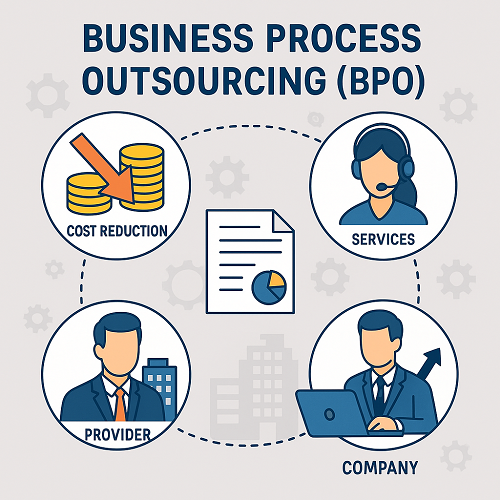Business Process Outsourcing (BPO) has become one of the most effective strategies for companies that want to cut costs, scale quickly, and focus on what they do best. In 2025, outsourcing is no longer just about saving money—it’s about gaining access to specialized expertise, advanced technology, and global talent pools that can transform the way businesses operate.
This guide walks you through everything you need to know about BPO: what it is, why companies use it, the benefits and risks, and how to decide if it’s right for your business.
What is Business Process Outsourcing?
At its core, Business Process Outsourcing is when a company hires an external service provider to handle specific business functions. These functions can be customer-facing, like call centers and sales support, or internal, like payroll and accounting.
Instead of stretching internal resources thin, businesses partner with experts who can deliver these services more efficiently and at scale.
How BPO Has Evolved
The outsourcing industry has grown and shifted dramatically over the past few decades:
- 1980s–1990s: Outsourcing began with manufacturing and simple back-office tasks.
- 2000s: Offshore call centers and customer service hubs rose in regions like India and the Philippines.
- 2010s: Outsourcing expanded into IT services, HR, and finance, with digital tools improving efficiency.
- Today: Automation, AI, and cloud technology have redefined outsourcing, making it a driver of innovation rather than just cost-cutting.
Types of BPO
Not all outsourcing looks the same. Here are the main categories:
- Front-office BPO: Customer service, technical support, marketing, and sales.
- Back-office BPO: Finance, HR, payroll, compliance, procurement, and IT operations.
- Offshore BPO: Services handled in distant, lower-cost countries.
- Nearshore BPO: Services outsourced to nearby countries with cultural and time-zone alignment.
- Onshore/Domestic BPO: Services handled by third parties within the same country.
What Services Are Commonly Outsourced?
Some of the most popular areas for outsourcing include:
- Customer support (call centers, chat, email)
- IT help desk and infrastructure management
- Finance & accounting
- Human resources (recruitment, onboarding, payroll)
- Procurement and supply chain management
- Legal and compliance support
- Marketing and sales campaigns
Why Companies Choose BPO
The drivers behind outsourcing go far beyond budget savings. Companies turn to BPO to:
- Reduce costs and streamline operations
- Gain access to skilled expertise and advanced technology
- Scale operations up or down with demand
- Focus internal resources on strategic priorities
- Improve quality, speed, and service levels
- Mitigate risk through global distribution of operations
The Risks of Outsourcing
Outsourcing isn’t without challenges. Businesses need to carefully manage:
- Data security & privacy risks
- Communication and cultural differences
- Hidden costs and scope creep
- Vendor dependency
- Regulatory compliance issues
The key to success lies in strong contracts, clear performance metrics, regular communication, and robust security protocols.
Choosing the Right BPO Partner
Finding the right outsourcing partner is half the battle. Look for:
- A proven track record in your industry
- Advanced technology capabilities (automation, analytics, AI)
- Strong compliance certifications (ISO, SOC 2, GDPR, HIPAA)
- Clear service level agreements (SLAs) and transparent pricing
- Cultural alignment and effective communication practices
Understanding Costs & ROI
Outsourcing can save anywhere from 20% to 60% depending on the function and location. Common pricing models include:
- Fixed-price contracts
- Per-transaction or volume-based fees
- Performance-based pricing tied to KPIs
- Hybrid models combining fixed and variable fees
To calculate ROI, weigh direct cost savings, additional revenue from improved performance, and long-term gains in agility and scalability.
The Role of Technology in BPO
Modern outsourcing is powered by technology. Key enablers include:
- Robotic Process Automation (RPA): Automates repetitive tasks.
- Artificial Intelligence (AI): Chatbots, predictive analytics, fraud detection.
- Cloud computing: Enables scalability and flexibility.
- Big Data & Analytics: Improves decision-making and performance monitoring.
What the Future Holds
Looking ahead, the BPO industry will continue to evolve with:
- Hyperautomation combining RPA, AI, and advanced analytics
- Industry-specific outsourcing (healthcare, fintech, legal)
- Nearshoring for supply chain resilience
- Greater focus on employee well-being within BPO firms
- Sustainability and ESG as vendor selection criteria
Real-World Examples
- Success story: A global bank outsourced its accounting operations, reducing processing times by 70% while saving 40% on costs.
- Cautionary tale: A retailer outsourced customer service without proper quality controls, leading to a spike in customer complaints and lost revenue.
Frequently Asked Questions
Is BPO the same as outsourcing?
Not exactly. BPO specifically refers to outsourcing business processes, while outsourcing can also include manufacturing and other functions.
What’s the difference between BPO, KPO, and ITO?
- BPO: Business process outsourcing (customer service, HR, accounting).
- KPO: Knowledge process outsourcing (analytics, research, strategy).
- ITO: IT outsourcing (infrastructure, software development, cloud services).
How quickly can you see results from BPO?
Simple processes may show savings within months; larger transformations often take a year or more.
Final Thoughts
BPO is no longer just a tool for cutting costs. In 2025, it’s a powerful strategy for growth, innovation, and resilience. Businesses that approach outsourcing with a clear plan, the right partner, and strong governance can unlock massive value—while those that rush in without preparation risk costly setbacks.
Whether you’re a startup looking to scale or a multinational seeking efficiency, outsourcing the right processes to the right partner can be a game-changer.
Partner with Ad Ops Solutions
Trust your business with some of the most experienced advertising operations professionals for success with your next project. Consider our managed ad ops service for optimal results.

